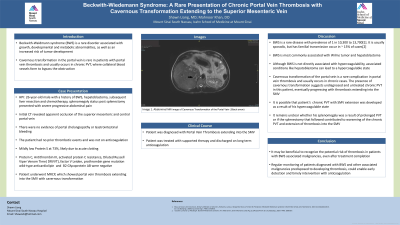Sunday Poster Session
Category: Liver
P1157 - Beckwith-Wiedemann Syndrome: A Rare Presentation of Chronic Portal Vein Thrombosis with Cavernous Transformation Extending to the Superior Mesenteric Vein
Sunday, October 22, 2023
3:30 PM - 7:00 PM PT
Location: Exhibit Hall

Has Audio
- SL
Shawn Liang, MD
Mount Sinai South Nassau
Bellmore, NY
Presenting Author(s)
Shawn Liang, MD1, Mahnoor Khan, DO2
1Mount Sinai South Nassau, Bellmore, NY; 2ISMMS Mt. Sinai South Nassau, Oceanside, NY
Introduction: Beckwith-Weidmann syndrome (BWS) is a rare disorder primarily observed in pediatric populations, with a prevalence of about 1 in 10,000. Although BWS is not directly linked to an increased risk of thrombosis, rare instances have been reported in cases of BWS-associated malignancies leading to a hypercoagulable state. This paper presents a case of a patient with a history of BWS, hepatoblastoma, splenomegaly and a rare occurrence of chronic portal vein thrombosis (PVT) extending into the superior mesenteric vein (SMV) with cavernous transformation of the portal vein.
Case Description/Methods: A 26-year-old male with a history of BWS, hepatoblastoma, subsequent liver resection and chemotherapy, splenomegaly status post splenectomy presented with severe progressive abdominal pain. Initial CT revealed apparent occlusion of the superior mesenteric and central portal vein, confirmed by magnetic resonance cholangiopancreatography (MRCP) as portal vein thrombosis extending into the SMV with cavernous transformation. The patient had no prior thrombotic events and was not on anticoagulation. Evaluation with Hematology-oncology showed mildly low Protein S at 73%, possibly due to acute clotting, while other coagulation workups were within normal ranges. He was treated and discharged on long term anticoagulation.
Discussion: Although BWS is not directly associated with hypercoagulability, associated conditions like hepatoblastoma can lead to a hypercoagulable state. Cavernous transformation of the portal vein is a rare complication in portal vein thrombosis and usually occurs in chronic cases. The presence of cavernous transformation suggests undiagnosed and untreated chronic PVT in this patient, eventually progressing with thrombosis extending into the SMV.
It may be beneficial to recognize the potential risk of thrombosis in patients with BWS associated malignancies, even after treatment completion. Regular monitoring of patients diagnosed with BWS and other associated malignancies predisposed to developing thrombosis, could enable early detection and timely intervention with anticoagulation. In turn, this could potentially prevent extensive development of portal vein thrombosis in cases such as this patient.

Disclosures:
Shawn Liang, MD1, Mahnoor Khan, DO2. P1157 - Beckwith-Wiedemann Syndrome: A Rare Presentation of Chronic Portal Vein Thrombosis with Cavernous Transformation Extending to the Superior Mesenteric Vein, ACG 2023 Annual Scientific Meeting Abstracts. Vancouver, BC, Canada: American College of Gastroenterology.
1Mount Sinai South Nassau, Bellmore, NY; 2ISMMS Mt. Sinai South Nassau, Oceanside, NY
Introduction: Beckwith-Weidmann syndrome (BWS) is a rare disorder primarily observed in pediatric populations, with a prevalence of about 1 in 10,000. Although BWS is not directly linked to an increased risk of thrombosis, rare instances have been reported in cases of BWS-associated malignancies leading to a hypercoagulable state. This paper presents a case of a patient with a history of BWS, hepatoblastoma, splenomegaly and a rare occurrence of chronic portal vein thrombosis (PVT) extending into the superior mesenteric vein (SMV) with cavernous transformation of the portal vein.
Case Description/Methods: A 26-year-old male with a history of BWS, hepatoblastoma, subsequent liver resection and chemotherapy, splenomegaly status post splenectomy presented with severe progressive abdominal pain. Initial CT revealed apparent occlusion of the superior mesenteric and central portal vein, confirmed by magnetic resonance cholangiopancreatography (MRCP) as portal vein thrombosis extending into the SMV with cavernous transformation. The patient had no prior thrombotic events and was not on anticoagulation. Evaluation with Hematology-oncology showed mildly low Protein S at 73%, possibly due to acute clotting, while other coagulation workups were within normal ranges. He was treated and discharged on long term anticoagulation.
Discussion: Although BWS is not directly associated with hypercoagulability, associated conditions like hepatoblastoma can lead to a hypercoagulable state. Cavernous transformation of the portal vein is a rare complication in portal vein thrombosis and usually occurs in chronic cases. The presence of cavernous transformation suggests undiagnosed and untreated chronic PVT in this patient, eventually progressing with thrombosis extending into the SMV.
It may be beneficial to recognize the potential risk of thrombosis in patients with BWS associated malignancies, even after treatment completion. Regular monitoring of patients diagnosed with BWS and other associated malignancies predisposed to developing thrombosis, could enable early detection and timely intervention with anticoagulation. In turn, this could potentially prevent extensive development of portal vein thrombosis in cases such as this patient.

Figure: Figure A: MRI image of Cavernous Transformation of the Portal Vein
Disclosures:
Shawn Liang indicated no relevant financial relationships.
Mahnoor Khan indicated no relevant financial relationships.
Shawn Liang, MD1, Mahnoor Khan, DO2. P1157 - Beckwith-Wiedemann Syndrome: A Rare Presentation of Chronic Portal Vein Thrombosis with Cavernous Transformation Extending to the Superior Mesenteric Vein, ACG 2023 Annual Scientific Meeting Abstracts. Vancouver, BC, Canada: American College of Gastroenterology.
